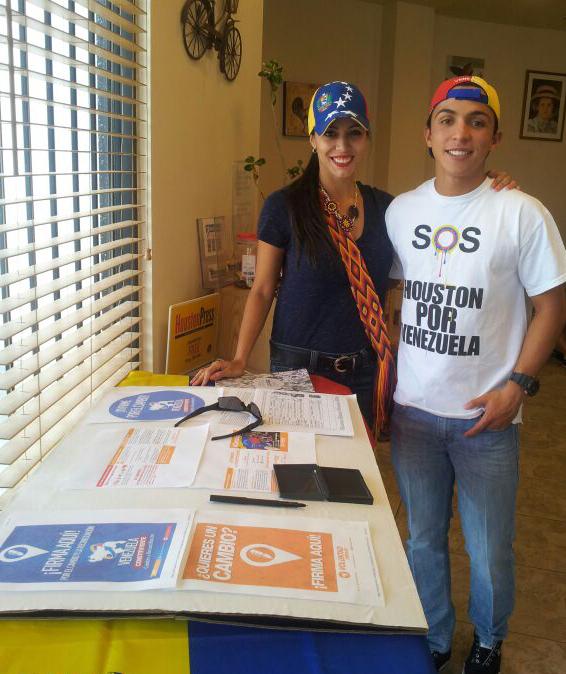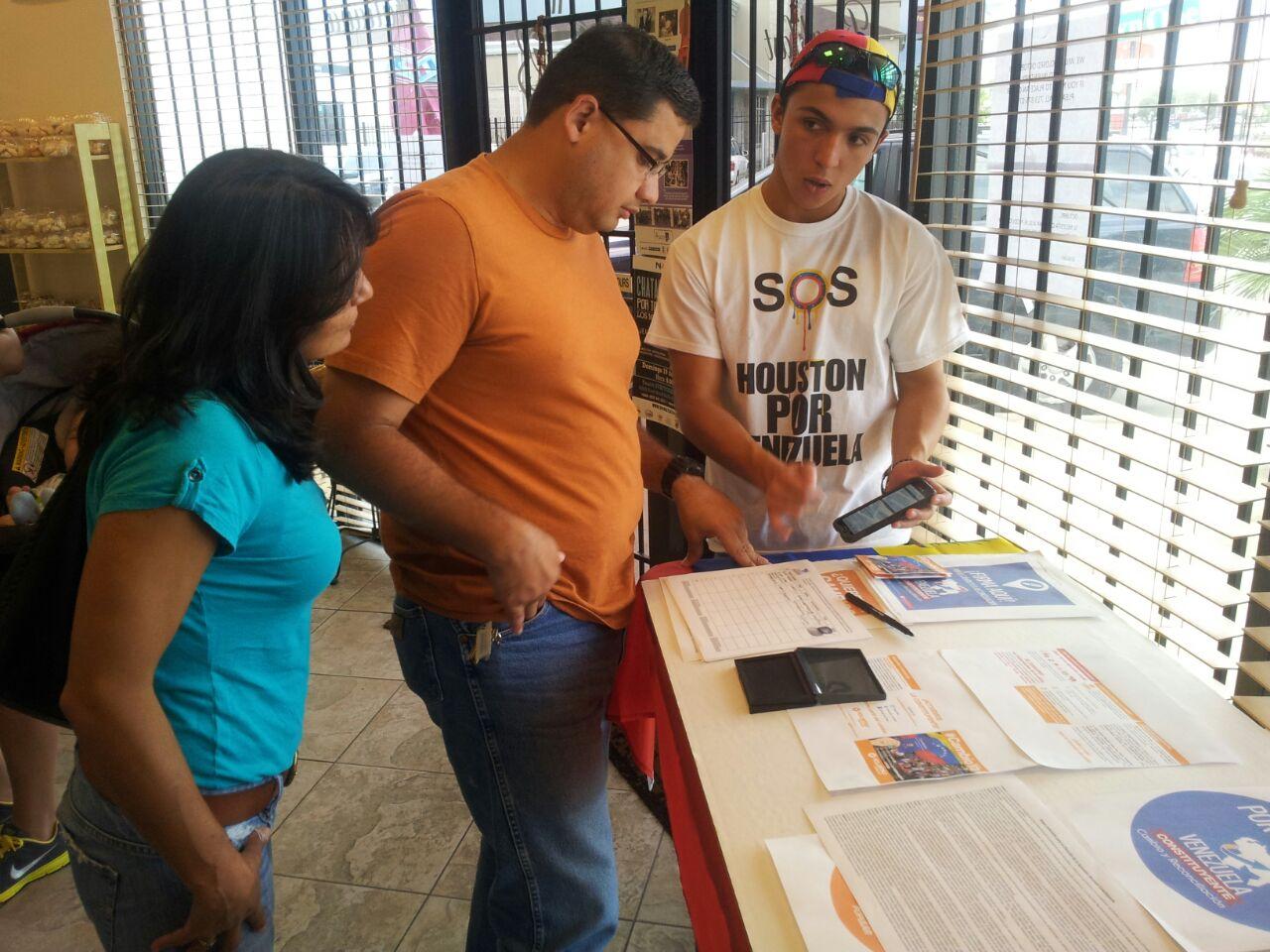Your donation will support the student journalists of Cypress Ranch High School. Your contribution will allow us to purchase equipment and cover our annual website hosting costs.
Junior Champions for Human Rights in Venezuela
March 18, 2015
For most, the concepts of flagrant government corruption, violent repression of outspoken citizens, and torture of opposition leaders would seem more in place in a fantastical dystopian novel than reality.
For junior Juan Galipoli, however, these ideas are far from fictional—in fact, these are things he has experienced firsthand.
Galipoli was born and raised in Venezuela at the start of what many deem an era of disintegrating democracy.
Following Hugo Chávez’s election to office in 1998, political and human rights group Freedom House declared that the country’s freedom rating dropped by almost half in just two years, indicating a lack of protection for civil liberties and political rights.
The Venezuelan government has been heavily criticized by Amnesty International as well. The organization has put the Venezuelan National Guard and the National Intelligence Service under fire for using excessive force to control protests and failing to bring detained protesters before a judge within the legal time limit.
The United Nations reports that there were 31,096 human rights violations complaints filed between 2011 and 2014. In November 2014, the UN Committee against Torture investigated allegations of torture and abuse of citizens at the hands of officials, and it was later stated that the Venezuelan government did not comply with torture investigations.
Though the violent repression of demonstrations has somewhat fallen in previous years, the Economist Intelligence Unit Democracy Index ranked Venezuela as the least democratic nation in South America, and Freedom House removed Venezuela from its list of countries with an electoral democracy in 2008.
There are a multitude of parties clamoring for an end to the abuses suffered at the hands of the government, and among them is “the strongest opposition party in Venezuela” – Voluntad Popular (People’s Will).
Galipoli is the coordinator of the Houston sector of the party, and at 18 years old, he’s the youngest leader in the party to date. Galipoli joined the Voluntad Popular party when he was just 16 after witnessing the injustices the Venezuelan people suffered at the hand of their government.
“I joined the party because two years ago, there seemed to be an opportunity for change,” Galipoli said. “I thought, ‘why am I not a part of that change?’”
Galipoli began raising his voice in political matters by writing posts on his blog, which called for greater change in protection of Venezuelan human rights. When he came to the United States at 16, party leaders named Galipoli as the main coordinator for the party in the Houston area.
“It was hard for me when I got here, because I was named a coordinator when I was with the party only one or two months,” he said. “It was hard but at the same time, there were a lot of protests and demonstrations from the Venezuelan community here in Texas to support the people in Venezuela.”
As coordinator, Galipoli is in charge of organizing activities and meetings to raise awareness and support of the situation in his home country. In the last year, he has met with numerous news outlets, including CNN, KHOU, and Telemundo, and has met with U.S. politicians, such as Senator Ted Cruz and Houston mayor Annise Parker, to garner support for his cause.
Galipoli also oversees the electoral processes in the area, and makes arrangements to ensure that Venezuelans living in Houston can vote in local elections. One activity he recently helped organize was a protest rally at Cinco Ranch High School on Sunday, Feb. 22, which attracted close to 2,500 people, according to Galipoli.

Galipoli poses with a supporter during a Voluntad Popular event.
Though these small victories are definitely a step in the right direction, Galipoli has bigger plans for his party.
“We want democracy, liberty, freedom for all—but at the same time, unity,” he said. “The Venezuelan society is completely divided right now. We want to have a nation that is united, where people have rights and those rights are respected. That is real democracy and equality for all.”
The members of Voluntad Popular are well-familiar with the current government’s habit of ignoring traditional democratic ideals. The party was created in 2009 by current National Coordinator Leopoldo López in response to the Venezuelan government’s human rights and personal freedom violations under former president Hugo Chávez and his successor Nicolas Maduro.
The party identifies itself as pluralist and democratic movement committed to the “realization of the social, economic, political, and human rights of every Venezuelan” and declares that its fundamental pillars are “progress, democracy, and social action.”
Voluntad Popular has organized and supported numerous peaceful protests in Venezuela, many of which have been challenged by the government.
One of these incidents includes a peaceful protest march organized by the Movimiento Estudiantil (Student Movement) and supported by Voluntad Popular in early March 2014. The march was brought to a halt when the National Guard and National Police dispersed the marchers using gunshots and tear gas. This violence prevented the protestors from demanding the resignation of public advocate Gabriela Ramirez for her justification of the Maduro administration’s human rights violations (these accused violations included torture).
Despite the party’s scattered successes, the government has taken steps to silence the party. Voluntad Popular leader and founder Leopoldo López was arrested in February 2014 on dubious charges, of which no evidence has been presented.
López’s arrest has been condemned by human rights organizations around the world. Amnesty International called it “a politically motivated attempt to silence dissent,” and Human Rights Watch later accused the Venezuelan government of “adopting the classic tactics of an authoritarian regime.”
The Human Rights Foundation also called for López’s immediate release, saying that “either Maduro releases López and calls for an honest dialogue with all of the opposition, or he must step down for the sake of all Venezuelans … Venezuela does not need an executioner willing to kill half of the country. Venezuela needs a president.”
López is but one figurehead of the Venezuelan democratic movement, and his arrest, according to Galipoli, signifies the government’s continuing persecution of any opposition.
“[López] just wants equality for everyone,” said Galipoli. “That’s what I’m fighting for.”
This fight for equality is far more than a political movement for Galipoli. Many of his friends and colleagues have been affected by the turbulent climate in Venezuela, with many either thrown into jail or forced to leave the country. Due to his level of involvement with Voluntad Popular, Galipoli fears he may not be safe, either.
“A challenging part of this job is that it’s dangerous,” he said. “There is a very high probability that the Venezuelan government knows who I am. So if I go back, I may have problems going into my own country.”
Lack of safety isn’t just an issue that affects those who leave the country. There are a large number of reports of attacks on civilians filtering out of Venezuela on a regular basis. The most recent of these attacks was on a 14-year-old boy.
The young schoolboy, named Kluiver Roa, was shot in the head by police officers during an anti-government protest in February. Many opposition leaders have staunchly decried this ruthless act of violence.
In tragedies like these, Galipoli says he sees himself.
“It feels personal,” he said. “I feel like they could be my friends or my siblings. I’m 18; this boy was only four years younger than me. He was just a kid.”
Galipoli says it is for people like Roa that he does this.
“We try to get attention to the situation [in Venezuela] so that things like this don’t have to happen anymore,” he said.
Besides bringing attention to human rights protection, Galipoli says his and the party’s goals include a complete overhaul of the current government system. Voluntad Popular aims for a revitalized economic model, which includes the increase of internal production.
“We import everything we consume,” he said. “[Even] gasoline—we are an oil country, and we are importing gasoline … We will increase internal production in order to have a better economy. This will help people have a better life and to have better wages.”
Voluntad Popular also wants to dramatically tighten domestic security. Venezuela currently has the second-highest homicide rate, and Galipoli has criticized the law enforcement’s propensity to focus more on petty crime and target student protesters rather than persecute “the bad guys.”
The root of this crime problem, he says, is ultimately education.
“The education in Venezuela is terrible,” he said. “A new public education system needs to be created in order to help people educate themselves to have better jobs and better lives.”
Though this kind of renovation is impressive, many have called into question how possible it would be to achieve it.
“It’s possible but it’s not easy,” Galipoli said. “We have been fighting for almost 17 years and … the government tries to make us feel like we’ll never come out of this problem. And we can’t let that happen—we have to keep our minds thinking. I have to keep in this battle, fighting for my country and what I know is right.”
Galipoli has undoubtedly achieved remarkable triumphs in his party, but he is quick to remind that he is still a high school student behind everything else.
“I’m 18 years old,” he said. “I have a job, I study, I take AP classes. But at the same time, I feel that I need to do something for my country.”
After he graduates, Galipoli has no plans of slowing down. He hopes to study political science at an American university and then return to Venezuela to make lasting change on the ground level.
“I feel like I can help more inside the country than outside of it,” he said. “I want to work actively for the community. I don’t care if the government is still there or not, I don’t care if I’m being chased by the government, that’s what I’m focusing on.”
Galipoli hopes his party can make a lasting impression not only on Venezuelan life, but on the global community as well.
“Many countries are looking away from what is going on in Venezuela,” he said. “I want to teach the world that when someone is suffering … [they need] to raise their voices and do what is in their hands to do to achieve what is right.”
Ultimately, that is what Galipoli is fighting for: unity.
“I want to see countries standing up for each other and supporting each other, putting the rights and safety of the people first,” he said.
Though it is unlikely this unity will be achieved in the immediate future, Galipoli promises to persevere.
“We’ll keep on the fight until the fight ends,” he said.
